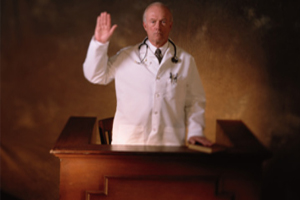Month: August 2018
The Olympics of Court Reporting

How to Make an Impact
as an Expert Witness
Every day expert witnesses testify at trials and depositions
across the country, covering topics as diverse as DNA analysis, blood spatter, injury
causation, life care planning, and so much more. These professionals are
designated as expert witnesses by the Court because they possess special
knowledge about a topic far beyond that of a layperson.
Unfortunately, expertise in a field doesn’t always translate
to being able to explain those principles to non-experts. This can be a problem
for attorneys, especially in cases that hinge on expert testimony. If an expert
witness isn’t able to clearly explain the topic to a jury, or if they come
across as pompous or biased, jurors may completely discount their testimony.
As court reporters, we capture expert testimony at least on
a weekly basis. The best expert witnesses we’ve encountered have a few things
in common – qualities potential clients can ascertain in a conversation or two.
Here are some of the common qualities we’ve seen in great expert witnesses –
outside of their topic knowledge.
·
They make
the testimony come alive. Well,
making testimony come alive might be a bit of a stretch. A convincing expert,
though, could be talking about the physics of a car crash, blood spatter, DNA, or
how an injury happened, and capture the attention of the jury. Experts cannot
avoid their field’s “jargon” while testifying, but they can find
engaging ways to describe their opinion.
·
They
believe that “teaching” is part of their job description. A
professional expert witness knows that part of their job is to teach basic
principles of their field to all involved – counsel, judge, jury.
·
They
can relate to “normal” people. Even if their IQ is right up
there with Stephen Hawking (and they’re sure you know it), an effective expert
witness is able to leave their ivory tower pretenses at home. No one wants to
feel talked down to, even juries.
·
They
are articulate and speak clearly. In addition to being a teacher, an
expert witness is also a public speaker. It’s crucial that they don’t mumble
and that they’re able to project their voice.
·
They
are organized. Whether testifying via videotaped deposition or live in
court, the expert should have all the required or customary information in their
file (and counsel should inform them of exactly what that is). Looking like one
is playing games is never a good look.
·
They
are impartial, or can leave personality issues aside when testifying.
Perhaps the expert witness has some strong opinions about the case, the
parties, counsel, or the manner in which the case has been handled. Having an
opinion is not a problem; making that opinion apparent is a problem. In one
murder case we worked on in North Carolina, a defendant’s expert witness so
blatantly excoriated the prosecution and the prosecution’s expert that he came
off as smug and too biased to render a valid expert opinion. In post-trial
interviews, jurors said they were turned off by his attitude and ignored his
opinion.